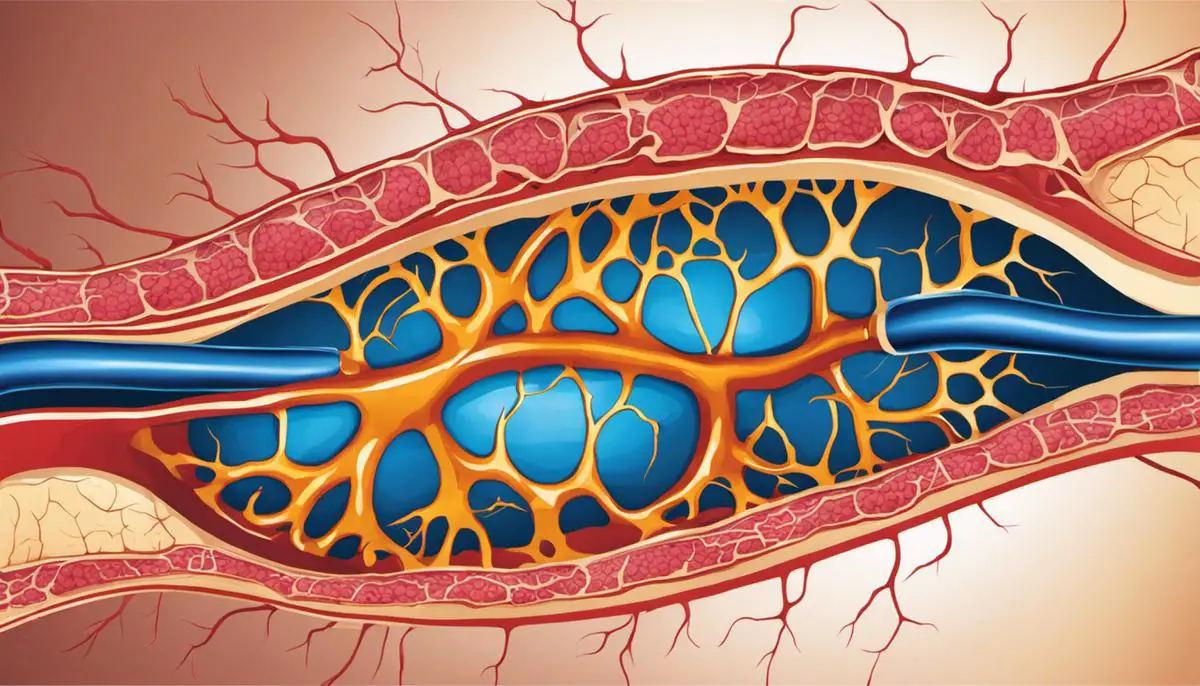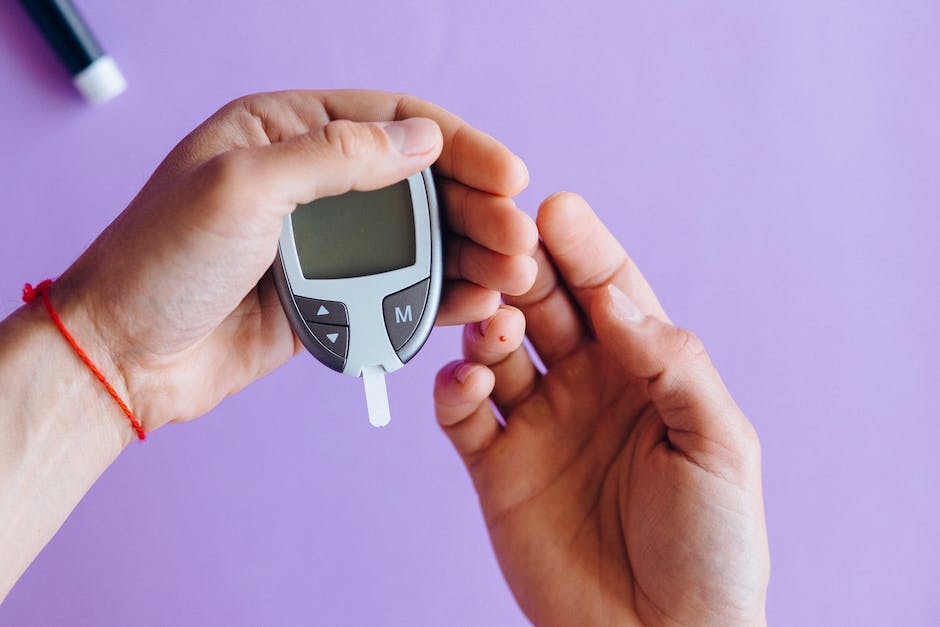Upon hearing the term ‘diabetic neuropathy,’ one’s mind may immediately connote a medical condition shrouded in complexity and unfamiliarity. However, for a significant number of men grappling with diabetes, this phrase bears much closer home. Diabetic neuropathy is not a separate disease in itself, but a series of nerve damage types ensuing from chronic high blood sugar and insulin resistance often accompanying diabetes. This damage primarily afflicts the feet and legs but could encompass other parts as well, leading to a myriad of symptoms that can drastically impact quality of life. An understanding of the types of diabetic neuropathies, their corresponding symptoms, and ways to manage them is therefore paramount not only for males living with diabetes, but also their caregivers and the broader society.
Definitions and Causes
Understanding Diabetic Neuropathy: Causes and Effects
Diabetic neuropathy refers to nerve damage that occurs as a result of diabetes, specifically due to chronic high blood sugar levels, known as hyperglycemia. When high blood sugar levels persist over a prolonged period, they can cause damage to nerve fibers throughout the body. This, in turn, can disrupt normal functioning and cause a variety of symptoms. Although any nerve in the body can get affected, the most commonly impacted areas are the feet and legs.
Insulin Resistance and Diabetic Neuropathy
A critical factor that plays a role in the onset and acceleration of diabetic neuropathy is insulin resistance. In essence, insulin resistance is a condition in which the body’s cells become less responsive to the hormone insulin, responsible for regulating blood sugar levels. This condition can lead to higher levels of glucose in the blood, increasing the risk of developing neuropathy. Research suggests that men with insulin resistance often demonstrate higher levels of neuropathic pain, thereby worsening the condition.
Diabetic Neuropathy Symptoms in Men
The onset of diabetic neuropathy is usually gradual, and initial symptoms can be mild. Over time, however, these symptoms can become severe and debilitating. In men, diabetic neuropathy can typically manifest as numbness or tingling in the feet or legs, sharp pains or cramps, increased sensitivity to touch, loss of balance or coordination, and muscle weakness.
The numbness or decreased sensation caused by diabetic neuropathy often implies that minor injuries to the feet may go unnoticed, which can result in serious infections and complications. Men with this condition might also experience problems with digestion, such as constipation; problems with urination; sexual dysfunction; and changes in sweat patterns.
The Link between Hyperglycemia and Diabetic Neuropathy
Increased blood sugar levels, or hyperglycemia, are believed to damage nerves directly by affecting the small blood vessels that nurture your nerves with oxygen and nutrients. This can result in the onset of diabetic neuropathy symptoms in men.
The metabolic effects of prolonged high blood sugar can lead to changes in the nerves’ structural and physiological characteristics, making them more susceptible to damage. Hence, effective management of blood glucose levels is vital in preventing or managing the symptoms of diabetic neuropathy in men.
Managing Diabetic Neuropathy
Dealing with diabetic neuropathy is a lifelong pursuit that requires a considerable amount of dedication. It’s possible to manage and even ease the symptoms of this condition through regular physical activity, maintaining a balanced diet, and routine medical check-ups. It’s equally crucial to ensure your blood glucose levels are well-regulated and take steps to address insulin resistance, which can alleviate the progression and severity of symptoms as time goes on.

Types of Diabetic Neuropathy in Men
Identifying the Different Types and Symptoms of Diabetic Neuropathy in Men
Diabetic neuropathy refers to nerve damage resulting from diabetes, a condition in which high glucose levels can have harmful effects on nerve cells all over the body. This condition can manifest specific, highly noticeable symptoms in men. Recognizing these early warning signs is essential for effectively managing the symptoms and keeping the condition under control.
Peripheral Neuropathy
It’s the most common. It usually affects the feet and legs, but it can also impact hands and arms. Symptoms typically start at the edges of your body and move towards the center. Men with peripheral neuropathy often experience numbness or a tingly sensation like “pins and needles”. Sharp, jabbing, or burning pain along with extreme sensitivity to touch and muscle weakness are also typical. The combination of numbness and reduced sensation can lead to ulcers, infections, and deformities by unnoticed minor injuries.
Autonomic Neuropathy
This type of neuropathy affects nerves that control the heart, bladder, stomach, intestines, sex organs, and eyes. For men, symptoms might include issues with sexual response, like erectile dysfunction or dryness. It can also lead to problems with digestion, urinary and bowel movements, and regulate body temperature.
Proximal Neuropathy
Also known as diabetic amyotrophy, this type of neuropathy affects nerves in thighs, hips, or buttocks. Men with proximal neuropathy experience sudden, severe pain in the hip and thigh or buttock. You might also face leg weakness or difficulty rising from a sitting position, substantial weight loss, and abdominal swelling, if the abdomen is involved.
Focal Neuropathy
This variant affects only one specific nerve, usually in the wrist, thigh, or foot. It could also affect the nerves of the back and chest, and those that control the eye muscles. Symptoms depend on the nerve affected, but typically men might experience severe muscle weakness or pain, tingling, or numbness.
Men living with diabetes are at elevated risk of developing diabetic neuropathy, particularly if their blood sugar levels aren’t effectively controlled. Other contributing risk factors include aging, high blood pressure, being overweight, and smoking. Should you observe any related symptoms, it is prudent to promptly seek medical advice. Fortunately, with rigorous blood sugar management and adopting a healthy lifestyle, the progression of diabetic neuropathy can be substantially limited.

Recognizing the Symptoms
Sensations of Numbness, Tingling, or Pain
The sensation of numbness or tingling in the extremities is one of the earliest and most common symptoms of diabetic neuropathy in men. This usually manifests firstly in the toes and feet, progressing upward to the legs, arms, and fingers. Addtionally, some patients might also experience a burning sensation or intense stabbing pains. These symptoms are indicative of nerve damage, which is brought on by excessively high blood sugar levels, frequently seen in diabetes.
Digestive Issues
Besides the sensory symptoms, diabetic neuropathy can also affect the digestive tract leading to symptom such as nausea, vomiting, diarrhea, or constipation. Known as gastroparesis, this condition occurs when the vagus nerve responsible for controlling the stomach muscles becomes damaged, resulting in slowed or incomplete digestion. This can lead to bloating, weight loss, and malnutrition due to the body’s inability to properly break down and absorb nutrients.
Urinary Tract Problems
Diabetic neuropathy in men can also manifest as urinary problems including difficulties in emptying the bladder, frequent urination, incontinence, and urinary tract infections. These urinary issues occur when the nerves controlling the bladder are damaged by prolonged exposure to high blood sugar levels.
Blood Pressure and Heart Rate Variations
Autonomic neuropathy, another variation of diabetic neuropathy, can impact the cardiovascular system. This results in symptoms such as dizziness and fainting, particularly after standing up, due to a sudden drop in blood pressure, a condition known as orthostatic hypotension. Men with diabetic neuropathy may also experience rapid resting heartbeat or have trouble recognizing angina, the pain that signals a heart attack.
Sexual Dysfunction
Another often overlooked symptom of diabetic neuropathy in men is sexual dysfunction. This can present as erectile dysfunction, difficulty achieving or maintaining an erection, or retrograde ejaculation, where semen enters the bladder instead of being expelled. These problems occur when neuropathy damages the nerves that control sexual function.
Recognizing and addressing the symptoms of diabetic neuropathy in men promptly is crucial, as it can significantly improve one’s quality of life by slowing or halting the disease’s progression. High blood sugar can cause nerve damage over time, a condition commonly referred to as diabetic neuropathy. Complications arising from this condition include issues with organ functioning, muscle weakness, severe pain and sensory-related symptoms such as the loss of sensation, numbness or tingling in the hands or feet.

Managing Diabetic Neuropathy: Lifestyle and Medical Options
Management of Diabetic Neuropathy through Glucose Monitoring
Regularly monitoring glucose levels is a central component in the management of diabetic neuropathy symptoms in men. Keeping blood sugar levels stable can minimize the risk of further nerve damage, which is a primary concern in diabetes. By consistently managing glucose levels, one can effectively control the symptoms of neuropathy and prevent further complications from developing.
Lifestyle Changes and Exercise
Lifestyle changes are integral to controlling glucose levels and consequentially managing diabetic neuropathy. Regular physical activity is known to increase insulin sensitivity and can aid in glucose management. Walking, swimming, and other low-impact exercises can be beneficial. In addition, it’s also important to maintain a healthy weight to keep blood glucose levels in normal ranges, as obesity or overweight status can exacerbate the issues. Note that before any exercise regime is started, a healthcare professional should be consulted to determine what level of physical activity is safe and appropriate.
Diet and Diabetic Neuropathy
Diet plays a significant role in managing diabetic neuropathy in men. Eating balanced meals with appropriate portions of carbohydrates, proteins, and fats are essential. Consistent carb counting can help with meal planning and glucose management. Foods rich in Vitamin B-12, such as lean meats and fortified cereals, are often recommended because specific types of neuropathy can be worsened by a B-12 deficiency. Limit the consumption of sugary drinks and processed food, instead focus on eating whole foods and lean proteins.
Medications for Diabetic Neuropathy
Medication is a key part of managing diabetic neuropathy symptoms. Antidepressants, Anti-seizure medications, and opioids are some classes of medications commonly used to control neuropathic pain. Topical agents like capsaicin cream and lidocaine patches might also be advised for specific cases. Controlling blood glucose is still the first line of defense but these medications can offer symptom relief.
Alternative Treatments and Physical Therapy
Physical therapy might be recommended to manage symptoms associated with muscle weakness or mobility issues. Therapists can provide exercises to improve strength, balance, and mobility. Alternative treatments like acupuncture, biofeedback, and electric nerve stimulation have been explored but these should be used as compliments to mainstream therapies and not as substitutes.
Patient Education
Patient education is crucial in managing diabetic neuropathy. Understanding the disease, engaging in self-care practices, and recognizing signs when the symptoms worsen can contribute to better outcomes. Frequent foot checks, proper footwear, foot hygiene, and timely medical check-ups are part of routine care for neuropathy patients.
It’s important to note that diabetic neuropathy management is a multi-layered approach that requires regular monitoring and healthcare professional consultation. This allows for the crafting of a personalized health management plan that caters to the unique health requirements of an individual.

Prevention: Keeping Diabetic Neuropathy at bay
An Overview of Diabetic Neuropathy in Men
The term ‘Diabetic Neuropathy’ essentially describes a form of nerve damage commonly found in individuals diagnosed with diabetes. This condition, which often results from high blood sugar levels, affects more men than women. The nerves most frequently damaged by diabetic neuropathy are those in the legs and feet. The symptoms of this ailment can vary widely, hinging on variables such as the specific type of diabetic neuropathy diagnosed and which nerves are impacted.
Signs and Symptoms
The signs and symptoms of diabetic neuropathy in men can be sub-divided based on the affected body areas or nerves. Some common symptoms of peripheral neuropathy (the most common type affecting the feet and legs) include numbness or reduced ability to feel pain or temperature changes, tingling or burning sensations, sharp pains or cramps, increased sensitivity to touch and loss of reflexes.
Autonomic neuropathy affects nerves that control the heart, regulate blood pressure or affect digestion. Symptoms can include changes in sweating, heat intolerance, problems with sexual response, and urinary inconsistencies. Men who experience autonomic neuropathy might face issues such as erectile dysfunction, retrograde ejaculation, or decreased sex drive.
Men can also experience focal neuropathy which affects specific nerves, often in the head, torso or leg, causing muscle weakness or pain. Symptoms can include double vision, aches around the area the nerve serves, and paralysis on one side of the face (Bell’s palsy).
Preventing Diabetic Neuropathy in Men
Preventing diabetic neuropathy involves complying with several best practices. Key amongst these is the maintenance of good glucose control. Through continuous monitoring of blood sugar levels, it is possible to prevent the onset or worsening of diabetic neuropathy.
Incorporating a balanced diet and regular exercise into one’s lifestyle can also be beneficial in preventing diabetic neuropathy. A diet rich in fruits, vegetables, lean meats, fish and grains can aid in managing blood glucose levels. Exercise, on the other hand, can help regulate blood glucose levels, manage weight, and improve overall health.
Regular check-ups and screening are essential in the early detection of diabetic neuropathy. Regular foot exams are recommended as neuropathy is most common in the feet. Annual check-ups for heart disease risk factors such as cholesterol and blood pressure and screening for kidney function should also be undertaken.
Medical Management & Pharmaceuticals
Medications are also available to help manage the symptoms of diabetic neuropathy. Antidepressants, anti-seizure drugs, opioids, and topical creams can be used to manage pain. In cases where men have erectile dysfunction due to autonomic neuropathy, medications like Sildenafil (Viagra) or Tadalafil (Cialis) can be prescribed.
In addition to these measures, it is essential for men to manage stress and stay committed to their healthcare regimen to prevent diabetic neuropathy effectively. Lifestyle modifications and careful management of diabetes can significantly reduce the risk and slow the progression of this disease.

Prevention always holds the upper hand as the best medicine, and diabetic neuropathy is no exception. As such, practicing stringent glucose control, following a balanced diet, engaging in regular exercise, and ensuring routine checks are imperative steps in thwarting the onset or progression of diabetic neuropathy. Becoming informed on diabetic neuropathy and its manifestations in men lights the path to more empathetic caregiving, informed decision-making, and the application of practical strategies to live a healthy and fulfilling life, even within the contours of a diabetic condition. Consequently, understanding, managing, and preventing diabetic neuropathy is a shared responsibility that calls for concerted efforts by individuals, caregivers, healthcare professionals, and community organizations alike, reinforcing a collective fight against the challenges diabetes poses.
